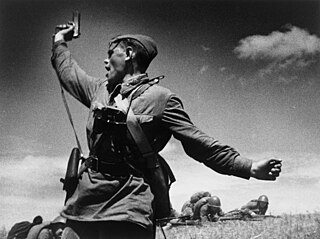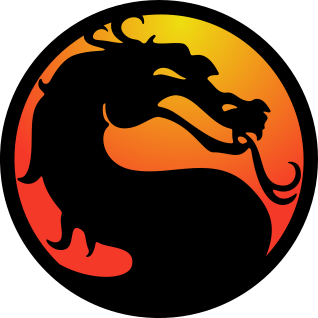
Mortal Kombat: Annihilation is a 1997 American science fantasy martial arts action film directed by John R. Leonetti. A sequel to the 1995 film Mortal Kombat, based on the video game series Mortal Kombat by Midway Games. It stars Robin Shou, Talisa Soto, Brian Thompson, Sandra Hess, Lynn "Red" Williams, Irina Pantaeva, Marjean Holden, Musetta Vander, and James Remar. Although the story picks up where the last film left off, only two of the lead actors reprised their roles.

Sub-Zero is the alias of two video game characters from the Mortal Kombat franchise; one of which was amongst the original characters in the first Mortal Kombat game in 1992. Sub-Zero is a formidable fighter possessing the innate ability to control ice in many forms and whose defining character trait is his fierce rivalry with his nemesis Scorpion. In his first return appearance in Mortal Kombat II, it was revealed that the original Sub-Zero had died during the events of the first game and was replaced by his brother. In the subsequent games, the younger brother remained as Sub-Zero, while the older brother became the wraith Noob Saibot. The first incarnation had his own spin-off adventure game. The character has been well-received by gaming media.
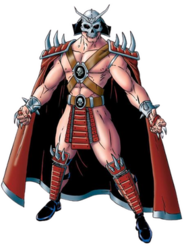
Shao Kahn is a video game character introduced in Mortal Kombat II, and is a recurring character and antagonist of the video game series and extended franchise. Shao Kahn is depicted as a brutal warlord who is the Emperor of the mystical realm Outworld. Feared for his godlike strength and knowledge of black magic, he seeks to conquer all of the realms of the Mortal Kombat universe and merge them with Outworld.
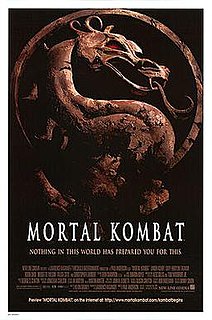
Mortal Kombat is a 1995 American fantasy martial arts action film written by Kevin Droney, directed by Paul W. S. Anderson, produced by Lawrence Kasanoff, and starring Robin Shou, Linden Ashby, Bridgette Wilson and Christopher Lambert. It is a loose adaptation of the early entries in the fighting game series Mortal Kombat and the first installment of the live-action Mortal Kombat film series.

Scorpion is a playable character, occasional boss character, and the mascot of the Mortal Kombat fighting game franchise created by Midway Games. Making his debut as one of the original seven playable characters in Mortal Kombat in 1992, he is an undead ninja specter seeking revenge for his own death at the hands of Quan Chi, making him an anti-hero which has been his main role throughout the course of the series up until Mortal Kombat X but still remains neutral.

Noob Saibot is a fictional character from the Mortal Kombat fighting game series. He debuted as an unplayable hidden character in Mortal Kombat 2, in which he was a black silhouette of the game's other male ninjas, and made his first selectable appearance in the console versions of Ultimate Mortal Kombat 3. His name consists of the surnames of Mortal Kombat creators Ed Boon and John Tobias spelled backwards.

Mortal Kombat II is a fighting game originally produced by Midway for the arcades in 1993. It was later ported to multiple home systems, including the MS-DOS, Amiga, Game Boy, Sega Game Gear, Sega Genesis, Sega Saturn, Super Nintendo Entertainment System, and various PlayStation consoles, mostly in licensed versions developed by Probe Entertainment and Sculptured Software and published by Acclaim Entertainment.
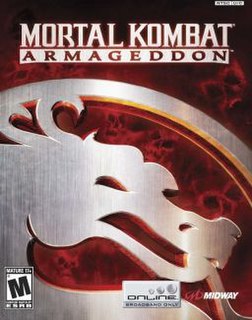
Mortal Kombat: Armageddon (MK:A) is the seventh main video game in the Mortal Kombat fighting game series. The PlayStation 2 and Xbox versions were released in October 2006, with a Wii version released on May 29, 2007 in North America. The Xbox version was not released in PAL territories. Chronologically the final chapter in the original Mortal Kombat storyline, it features virtually every character from the previous games. Players select one of them and battle a selection of the other fighters to determine the fate of the Mortal Kombat universe.
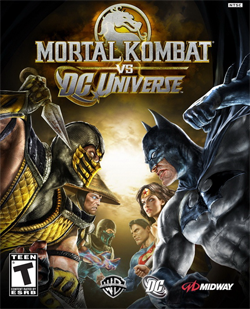
Mortal Kombat vs. DC Universe (MKvs.DCU) is a crossover fighting video game between Mortal Kombat and the DC Comics fictional universe, developed and published by Midway Games. The game is also the eighth instalment in the main Mortal Kombat series, despite the story not being connected to the first seven games or any other game that was released after this one. The game was released on November 16, 2008 and contains characters from both franchises. Its story was written by comic writers Jimmy Palmiotti and Justin Gray. The game was followed by a Mortal Kombat reboot in 2011 and by Injustice: Gods Among Us in 2013.

Mortal Kombat is a fighting video game developed by NetherRealm Studios and published by Warner Bros. Interactive Entertainment. The game is the ninth main installment in the Mortal Kombat series and is a reboot of the franchise. The game was released for the PlayStation 3 and Xbox 360 systems in April 2011, and a PlayStation Vita port was released in May 2012. An expanded version of the game, titled Mortal Kombat: Komplete Edition, was released for Xbox 360 and PlayStation 3 in February 2012 and for Microsoft Windows in July 2013.

Mortal Kombat (MK) is an arcade fighting game developed and published by Midway in 1992 as the first title in the Mortal Kombat series. It was subsequently released by Acclaim Entertainment for nearly every home platform of the time. The game focuses on the journey of the Shaolin monk Liu Kang to save Earthrealm from the evil sorcerer Shang Tsung, ending with their confrontation in the tournament known as Mortal Kombat. It introduced many key aspects of the Mortal Kombat series, including the unique five-button control scheme and gory finishing moves called Fatalities.
Mortal Kombat: Rebirth is a 2010 detailed short film directed by Kevin Tancharoen, with fight choreography by Larnell Stovall, who also choreographed Undisputed III: Redemption. Based on the Mortal Kombat series of fighting games, the short-film "actually was made by the director to sell Warner Bros. on his vision for a reimagined Mortal Kombat film." The pitch eventually evolved into the web series Mortal Kombat: Legacy.
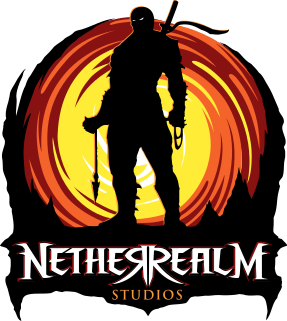
NetherRealm Studios is an American video game developer based in Chicago, Illinois, founded in May 2010 to replace Warner Bros. Interactive Entertainment's WB Games Chicago subsidiary. Led by video game industry veteran and Mortal Kombat co-creator Ed Boon, the studio is in charge of developing the Mortal Kombat and Injustice series of fighting games.

Liu Kang is a fictional character in the Mortal Kombat fighting game series from Midway Games, introduced as one of the original seven player characters in the 1992 first game as a Shaolin monk who enters the Mortal Kombat tournament to save Earthrealm (Earth). Following his victory in the tournament, Liu Kang becomes the Mortal Kombat series' hero as the champion and chief defender of Earthrealm guided by his mentor, the thunder god Raiden. He also becomes romantically involved with Princess Kitana, the adopted daughter of evil Outworld emperor Shao Kahn.

The Mortal Kombat series of fighting games, created by Ed Boon and John Tobias, has been the subject of various controversies since its creation in the 1990s. In particular, Mortal Kombat has often been criticised from a broad spectrum of politicians and other critics for its unrestrained use of graphic and bloody violence. The violent nature of the series, one of the earliest of its kind, has led to the creation and continued presence of the Entertainment Software Rating Board and other ratings boards for video games. Various Mortal Kombat games have been censored or banned in several countries, and the franchise was the subject of several court cases.

Mortal Kombat 11 (MK11) is a fighting video game developed by NetherRealm Studios and published by Warner Bros. Interactive Entertainment. Running on the Unreal Engine 3, it is the eleventh main installment in the Mortal Kombat series and a sequel to 2015's Mortal Kombat X. Announced at The Game Awards 2018, the game was released in North America and Europe on April 23, 2019 for Microsoft Windows, Nintendo Switch, PlayStation 4, and Xbox One. In late January 2019 it was reported that the Switch version was delayed in Europe, and was released on May 10, 2019. The game received generally favorable reviews from critics, who praised the gameplay, story, and improved netcode, although there was some criticism for the presence of microtransactions and over-reliance on grinding.
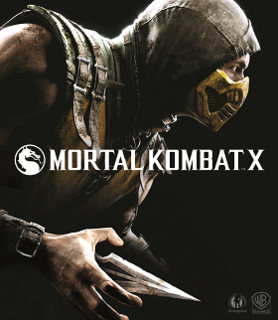
Mortal Kombat X (MKX) is a fighting video game developed by NetherRealm Studios and published by Warner Bros. Interactive Entertainment. Running on the Unreal Engine 3, it is the tenth main installment in the Mortal Kombat video game series and a sequel to the 2011 game Mortal Kombat. It was released on April 14, 2015 for Microsoft Windows, PlayStation 4, and Xbox One. NetherRealm Studios' mobile team developed a version for iOS and Android devices. High Voltage Software developed the PC version of the game, with Polish studio QLOC taking over the work on it shortly after the release of Kombat Pack 1.
